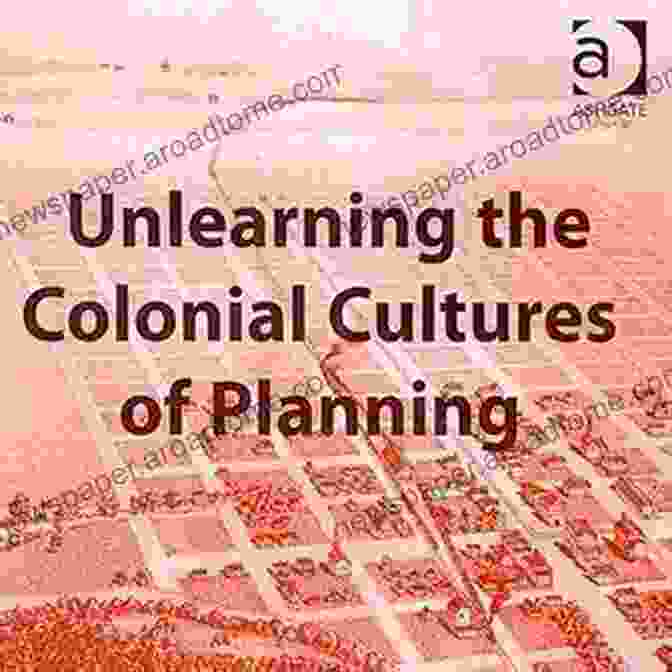Unlearning the Colonial Cultures of Planning: A Path to Transformative and Equitable Cities

In an era marked by growing urbanization and global interconnectedness, the need for sustainable and equitable cities has become more pressing than ever. However, traditional planning practices often perpetuate colonial legacies that reinforce inequality and marginalization.
5 out of 5
| Language | : | English |
| File size | : | 10475 KB |
| Text-to-Speech | : | Enabled |
| Screen Reader | : | Supported |
| Enhanced typesetting | : | Enabled |
| Word Wise | : | Enabled |
| Print length | : | 193 pages |
The groundbreaking book, Unlearning the Colonial Cultures of Planning, challenges these entrenched paradigms, offering a transformative approach to urban planning. Through a comprehensive examination of historical and contemporary practices, the authors, Dr. Kavita Pandit and Dr. Roberto Rocco, present a compelling case for decolonizing urban planning and embracing inclusive, participatory, and sustainable solutions.
Key Concepts and Principles
Unlearning the Colonial Cultures of Planning explores several key concepts that form the foundation of the book's transformative approach:
- Colonialism and Its Impact on Urban Planning: The book traces the historical roots of colonial urban planning practices, highlighting how they have shaped cities worldwide and contributed to systemic inequalities.
- Decolonization and Urban Planning: It presents a comprehensive framework for decolonizing urban planning, emphasizing the need to dismantle colonial power structures, challenge dominant narratives, and promote inclusive decision-making processes.
- Participatory Planning and Community Engagement: The authors advocate for participatory planning approaches that actively involve marginalized communities in shaping their urban environments, recognizing their knowledge, experiences, and aspirations.
- Equity and Sustainability: Unlearning the Colonial Cultures of Planning underscores the inextricable link between equity and sustainability, promoting planning practices that address social justice issues while ensuring environmental protection.
Real-World Examples and Case Studies
The book showcases a diverse range of case studies from around the world that demonstrate the transformative potential of decolonizing urban planning:
- São Paulo, Brazil: The chapter on "Urban Mega-Projects and the Right to the City" explores the controversial redevelopment of São Paulo's historic downtown, highlighting the need for participatory planning processes and the protection of marginalized communities.
- Dar es Salaam, Tanzania: The case study on "Informal Settlements and the Right to Housing" examines the challenges and opportunities of addressing informal settlements in Dar es Salaam, emphasizing the importance of community-led housing solutions.
- Vancouver, Canada: The chapter on "Indigenous Planning and the Right to Self-Determination" presents the groundbreaking work of the Musqueam First Nation in Vancouver, showcasing the power of indigenous knowledge and self-determination in urban planning.
Thought-Provoking Insights and Implications
Unlearning the Colonial Cultures of Planning offers thought-provoking insights and implications for professionals and policymakers:
- Rethinking Planning Education: The book calls for a fundamental rethinking of planning education, urging educators to incorporate decolonial perspectives, participatory approaches, and a focus on equity.
- Empowering Marginalized Voices: It emphasizes the crucial role of empowering marginalized voices in urban planning processes, ensuring that their needs, aspirations, and perspectives shape decision-making.
- Creating Inclusive Cities: The authors envision a future of inclusive cities where all residents have access to safe, affordable housing, quality public spaces, and opportunities for self-determination.
Unlearning the Colonial Cultures of Planning is an indispensable guide for urban planners, policymakers, and anyone interested in creating more equitable, sustainable, and inclusive cities. It provides a comprehensive framework for challenging colonial legacies, embracing decolonial approaches, and fostering participatory planning processes.
By unlearning the colonial cultures of planning, we can unlock the transformative potential of urban planning and build cities that truly serve the needs of all.
5 out of 5
| Language | : | English |
| File size | : | 10475 KB |
| Text-to-Speech | : | Enabled |
| Screen Reader | : | Supported |
| Enhanced typesetting | : | Enabled |
| Word Wise | : | Enabled |
| Print length | : | 193 pages |
Do you want to contribute by writing guest posts on this blog?
Please contact us and send us a resume of previous articles that you have written.
 Book
Book Novel
Novel Page
Page Chapter
Chapter Text
Text Story
Story Genre
Genre Reader
Reader Library
Library Paperback
Paperback E-book
E-book Magazine
Magazine Newspaper
Newspaper Paragraph
Paragraph Sentence
Sentence Bookmark
Bookmark Shelf
Shelf Glossary
Glossary Bibliography
Bibliography Foreword
Foreword Preface
Preface Synopsis
Synopsis Annotation
Annotation Footnote
Footnote Manuscript
Manuscript Scroll
Scroll Codex
Codex Tome
Tome Bestseller
Bestseller Classics
Classics Library card
Library card Narrative
Narrative Biography
Biography Autobiography
Autobiography Memoir
Memoir Reference
Reference Encyclopedia
Encyclopedia Jonathan Eig
Jonathan Eig Joseph Bottum
Joseph Bottum Joqlie Publishing Llc
Joqlie Publishing Llc Jonathan Moeller
Jonathan Moeller Pam Ostrowski
Pam Ostrowski Mark Tedeschi
Mark Tedeschi Rosemary Mander
Rosemary Mander Kate Whouley
Kate Whouley Jothy Rosenberg
Jothy Rosenberg Michael Billig
Michael Billig Judith Rich Harris
Judith Rich Harris Roger Flanagan
Roger Flanagan Josie Brown
Josie Brown Jonathan Richards
Jonathan Richards Joseph Shaules
Joseph Shaules Julia Huang
Julia Huang Stuart Mcgill
Stuart Mcgill Jonathan Edwards
Jonathan Edwards Norman L Cantor
Norman L Cantor John N Gardner
John N Gardner
Light bulbAdvertise smarter! Our strategic ad space ensures maximum exposure. Reserve your spot today!

 Matthew WardUnveiling Earth's Healing Embrace: A Beginner's Guide to Harnessing Natural...
Matthew WardUnveiling Earth's Healing Embrace: A Beginner's Guide to Harnessing Natural...
 Norman ButlerMillions of Americans Are Dying Before Their Time: Discover How, Who, and Why
Norman ButlerMillions of Americans Are Dying Before Their Time: Discover How, Who, and Why
 Jedidiah HayesMaster the Ancient Game of Chess: Unlock the Secrets of Strategy and Dominate...
Jedidiah HayesMaster the Ancient Game of Chess: Unlock the Secrets of Strategy and Dominate... Thomas PowellFollow ·15.3k
Thomas PowellFollow ·15.3k Guillermo BlairFollow ·13.5k
Guillermo BlairFollow ·13.5k Mark TwainFollow ·15.6k
Mark TwainFollow ·15.6k Chance FosterFollow ·7.8k
Chance FosterFollow ·7.8k Octavio PazFollow ·13.3k
Octavio PazFollow ·13.3k Reginald CoxFollow ·2.3k
Reginald CoxFollow ·2.3k Willie BlairFollow ·15.4k
Willie BlairFollow ·15.4k Randy HayesFollow ·15.7k
Randy HayesFollow ·15.7k

 Sidney Cox
Sidney CoxSpiritualism in the American Civil War
An Unseen Force in the...

 Robbie Carter
Robbie CarterEmpowering Healthcare Professionals: Discover the...
Welcome to the world of...

 Virginia Woolf
Virginia WoolfUnveil the Secrets of Nature's Healing Scents: "Growing...
Embark on an aromatic journey...

 Martin Cox
Martin CoxThe Fat Girl's Guide to Loving Your Body: Empowering...
Alt attribute: Confident plus-size woman...

 Graham Blair
Graham BlairUnlock the Secrets of Vegetables: Their Nutritional Power...
In the realm of culinary delights and...

 H.G. Wells
H.G. WellsStep-by-Step Guide to Crafting Astonishing Kumihimo...
Are you ready to embark on a captivating...
5 out of 5
| Language | : | English |
| File size | : | 10475 KB |
| Text-to-Speech | : | Enabled |
| Screen Reader | : | Supported |
| Enhanced typesetting | : | Enabled |
| Word Wise | : | Enabled |
| Print length | : | 193 pages |








